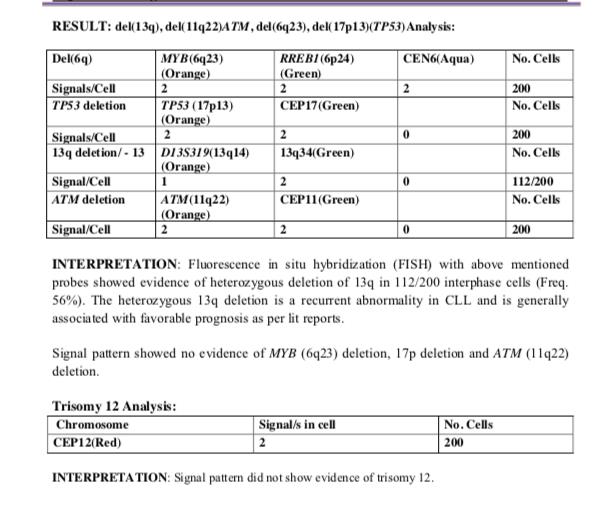hello, i just got my mothers reports of FISh it says 13 q deletion, i dont understand what that means, it would be very helpful if i can understand in layman's language and what it means, i am just very scared of the report, i am not going to the doctor as the report of karyotyping is still pending. once we will have that we would go to the doctor, in the meantime having the FISh test and not doing anything is very disturbing. replies would be very helpful.
RESULT: del(13q), del(11q22)ATM, del(6q23), del(17p13)(TP53)Analysis:
Del(6q)
MYB(6q23) (Orange)
RREB1(6p24) (Green)
CEN6(Aqua)
No. Cells
Signals/Cell
2
2
2
200
TP53 deletion
TP53 (17p13) (Orange)
CEP17(Green)
No. Cells
Signals/Cell
2
2
0
200
13q deletion/ - 13
D13S319(13q14) (Orange)
13q34(Green)
No. Cells
Signal/Cell
1
2
0
112/200
ATM deletion
ATM(11q22) (Orange)
CEP11(Green)
No. Cells
Signal/Cell
2
2
0
200
INTERPRETATION: Fluorescence in situ hybridization (FISH) with above mentioned probes showed evidence of heterozygous deletion of 13q in 112/200 interphase cells (Freq. 56%). The heterozygous 13q deletion is a recurrent abnormality in CLL and is generally associated with favorable prognosis as per lit reports.
Signal pattern showed no evidence of MYB (6q23) deletion, 17p deletion and ATM (11q22) deletion.
Trisomy 12 Analysis:
INTERPRETATION: Signal pattern did not show evidence of trisomy 12.
IGH (14q32) translocation Analysis:
INTERPRETATION: Fluorescence in situ hybridization (FISH) with an above mentioned probe did not show evidence of IGH translocation.
Impression: 13q deletion positive case.

 .
.